Goldener Zirkel SS 20
Posted on February 1, 2021 by Paul Fischer ‐ 5 min read

In the winter semester 2020/21, we, the mathematics student council, will award outstanding teaching in the past semester. We want to announce the awards in the three categories - adapted to the current circumstances - Digital Overall Concept, Innovative Use of Technical Possibilities, and Best Digital Communication and Support:
In the category Best digital Concept, an entire course, meaning professor and course leader, is awarded. Here we are looking for courses that have mastered the transition to digital teaching.
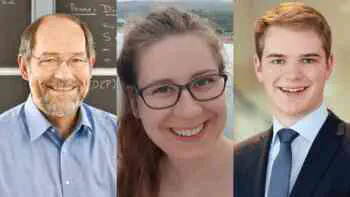 The lecture Linear and Convex Optimization (MA2504) by Prof Gritzmann, Ms Kirschbaum, and Mr Fiedler has distinguished itself through lecture videos that “even […] grandmother could understand” with multiple-choice questions to assess one’s understanding at the end of each video and “Moodle tests to monitor learning progress”. “Early communication […] also [concerning the] exam”, an excellent exercise concept with explanatory videos for selected tasks (determined by the students), well-supervised breakout rooms in the live exercises, and a constant effort to get and implement feedback gives them a well-deserved first place.
The lecture Linear and Convex Optimization (MA2504) by Prof Gritzmann, Ms Kirschbaum, and Mr Fiedler has distinguished itself through lecture videos that “even […] grandmother could understand” with multiple-choice questions to assess one’s understanding at the end of each video and “Moodle tests to monitor learning progress”. “Early communication […] also [concerning the] exam”, an excellent exercise concept with explanatory videos for selected tasks (determined by the students), well-supervised breakout rooms in the live exercises, and a constant effort to get and implement feedback gives them a well-deserved first place.
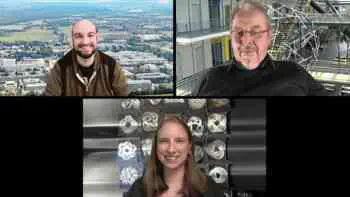 For the second place, we would like to congratulate Prof Richter-Gebert, Dr Werner, and Ms Polke for the lecture Projektive Geometrie (MA3203). This course stood out because of the “incomparably high-quality [lecture] videos”, the “very structured exercises”, the constant effort to provide feedback, the excellent communication and additional material to practice revise required basics.
For the second place, we would like to congratulate Prof Richter-Gebert, Dr Werner, and Ms Polke for the lecture Projektive Geometrie (MA3203). This course stood out because of the “incomparably high-quality [lecture] videos”, the “very structured exercises”, the constant effort to provide feedback, the excellent communication and additional material to practice revise required basics.
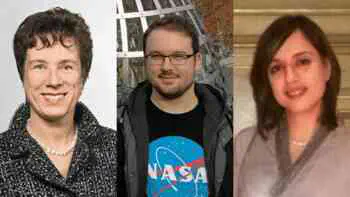 Third place goes to Prof Wohlmuth, Mr Muhr, and Prof Scarabosio, who impressed their students in the course Numerik gewöhnlicher Differentialgleichungen (MA2304) with their structured and excellent videos for both lectures and exercises, great dialogue with the students by the lecturer and the exercise coordinator and the “sensational tutorials”.
Third place goes to Prof Wohlmuth, Mr Muhr, and Prof Scarabosio, who impressed their students in the course Numerik gewöhnlicher Differentialgleichungen (MA2304) with their structured and excellent videos for both lectures and exercises, great dialogue with the students by the lecturer and the exercise coordinator and the “sensational tutorials”.
Furthermore, we would also like to honour the courses Lineare Algebra 2 (MA0005) by Prof Liedtke, Dr Mundelius, and Dr Himstedt and Mathematical Foundations of Machine Learning (MA4801) by Prof Wolf and Mr Caro, as well as the seminar From homotopical Algebra towards higher Categories by Prof Bauer and Prof Scheimbauer.
In the category Innovative Use of the Technical Possibilities, awards are to be given to persons or courses who have not only made the best of the current situation in their teaching but have fully exploited the newly available possibilities.
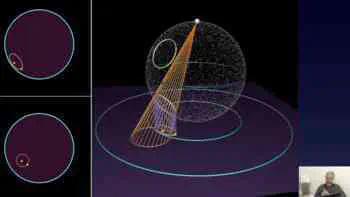
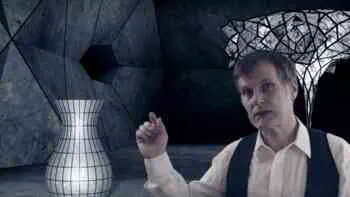 The first place for their “elaborately produced lecture videos” share Prof Hoffmann in Differentialgeometrie: Grundlagen (MA2204) and Prof Richter-Gebert in Projektive Geometrie (MA3203). Both professors have vividly presented the content in their videos with elaborate “integrated animations” and effects, creating a consistent design with Intro- and Outro music and equipped their documents with moving three-dimensional graphics. Nevertheless, the videos are “not overloaded with unnecessary gimmicks [and the content] is presented […] concisely”. Furthermore, the professors were always visible in the videos, creating a more personal lecture experience that was “very similar to ’normal’ lectures” and even exceeded them. In addition to conveying the subject of the lecture, the professors entertained their students with “illustrative application examples” and “historical backgrounds”, that were in no way inferior to the “Sendung mit der Maus” or professional “video channels on YouTube”.
The first place for their “elaborately produced lecture videos” share Prof Hoffmann in Differentialgeometrie: Grundlagen (MA2204) and Prof Richter-Gebert in Projektive Geometrie (MA3203). Both professors have vividly presented the content in their videos with elaborate “integrated animations” and effects, creating a consistent design with Intro- and Outro music and equipped their documents with moving three-dimensional graphics. Nevertheless, the videos are “not overloaded with unnecessary gimmicks [and the content] is presented […] concisely”. Furthermore, the professors were always visible in the videos, creating a more personal lecture experience that was “very similar to ’normal’ lectures” and even exceeded them. In addition to conveying the subject of the lecture, the professors entertained their students with “illustrative application examples” and “historical backgrounds”, that were in no way inferior to the “Sendung mit der Maus” or professional “video channels on YouTube”.
 For the great variety of used tools and the excellent implementation of all chosen concepts, we congratulate Prof Gritzmann, Ms Kirschbaum, and Mr Fiedler on Linear and Convex Optimization (MA2504) on their third place. Be it “Moodle tests for better understanding” and “to monitor the learning progress”, Panopto quizzes “to test one’s understanding”, “well-structured live exercises”, that have used supervised breakout rooms or the well-managed communication platforms to clarify individual questions, this course implemented them. Also, helpful lecture-, information- and explanation-videos were provided.
For the great variety of used tools and the excellent implementation of all chosen concepts, we congratulate Prof Gritzmann, Ms Kirschbaum, and Mr Fiedler on Linear and Convex Optimization (MA2504) on their third place. Be it “Moodle tests for better understanding” and “to monitor the learning progress”, Panopto quizzes “to test one’s understanding”, “well-structured live exercises”, that have used supervised breakout rooms or the well-managed communication platforms to clarify individual questions, this course implemented them. Also, helpful lecture-, information- and explanation-videos were provided.
We would also like to acknowledge Dr Mundelius’ exercise coordination for Lineare Algebra 2 (MA0005) and the lecture videos and exercise coordination of Prof Wolf and Mr Caro in Mathematical Foundations of Machine Learning (MA4801).
We would also like to honour the Best Digital Communication and Support concepts. This applies to communication between students and lecturers and concepts that provide the students, e.g. with learning groups or that enhance the interaction between all parties.
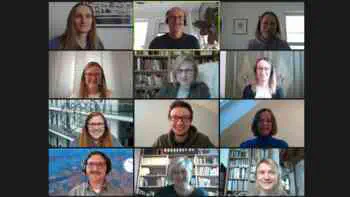 We want to congratulate the Mathematics Service Office in its first place. The “service office never let the students down during the Corona period [and we] were always well informed”, be it via the websites, emails, information events, or the like. Even with individual problems, the service office was quick and easy to communicate with by email. Despite a considerable amount of time and effort spent preparing for the transformation to the School on their part, it was always clear that one could find sufficient support and assistance in all matters. Among other things, free lecture notes were provided and sent to the second-semester students, and online get-togethers were organised to ensure more interaction among the students.
We want to congratulate the Mathematics Service Office in its first place. The “service office never let the students down during the Corona period [and we] were always well informed”, be it via the websites, emails, information events, or the like. Even with individual problems, the service office was quick and easy to communicate with by email. Despite a considerable amount of time and effort spent preparing for the transformation to the School on their part, it was always clear that one could find sufficient support and assistance in all matters. Among other things, free lecture notes were provided and sent to the second-semester students, and online get-togethers were organised to ensure more interaction among the students.
 We award second place to Prof Gritzmann, Ms Kirschbaum, and Mr Fiedler for the Linear and Convex Optimisation lecture (MA2504). This course stood out in this category with “video messages [from Professor Gritzmann] with information on the current status, the further procedure and motivational speeches”, detailed weekly reports, and well-supervised Moodle forums in which “questions […] were answered quickly and in detail”. Besides, there was the possibility to submit feedback and suggestions for improvement anonymously. Many emphases were placed on personal interaction in the live exercises, e.g. making use of breakout rooms.
We award second place to Prof Gritzmann, Ms Kirschbaum, and Mr Fiedler for the Linear and Convex Optimisation lecture (MA2504). This course stood out in this category with “video messages [from Professor Gritzmann] with information on the current status, the further procedure and motivational speeches”, detailed weekly reports, and well-supervised Moodle forums in which “questions […] were answered quickly and in detail”. Besides, there was the possibility to submit feedback and suggestions for improvement anonymously. Many emphases were placed on personal interaction in the live exercises, e.g. making use of breakout rooms.
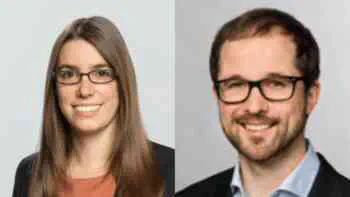 The third place in this category goes to Prof Bauer and Prof Scheimbauer for the seminar From homotopical Algebra towards higher Categories. In this advanced research area, the professors created a highly productive learning atmosphere with regular eye-level discussions among themselves and with the participants. This was complemented by the offer of personal consultation hours, the immediate provision of all necessary documents, the openness to suggestions for improvement, a well-supported RocketChat forum, occasional Q&A sessions/exercises, and a focus on personal interaction.
The third place in this category goes to Prof Bauer and Prof Scheimbauer for the seminar From homotopical Algebra towards higher Categories. In this advanced research area, the professors created a highly productive learning atmosphere with regular eye-level discussions among themselves and with the participants. This was complemented by the offer of personal consultation hours, the immediate provision of all necessary documents, the openness to suggestions for improvement, a well-supported RocketChat forum, occasional Q&A sessions/exercises, and a focus on personal interaction.
In addition, we would like to commend the courses Lineare Algebra 2 (MA0005) by Prof Liedtke, Dr Mundelius and Dr Himstedt, Diskrete Strukturen (MA0005) by Prof Weltge, Dr Brandenberg and Ms Seidel, Applications of Mathematical Biology (MA3602) by Prof Müller and Mr Schlicke and Advanced Topics in Algebraic Topology (MA5123) by Prof Scheimbauer and Mr Walde.

